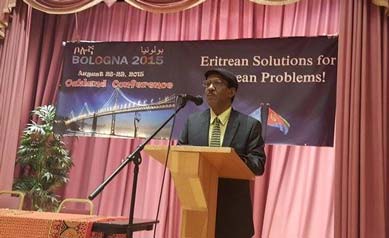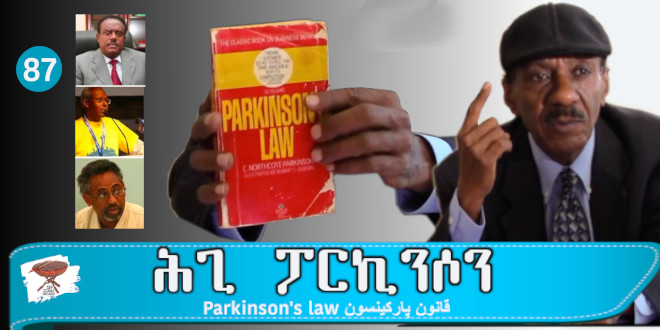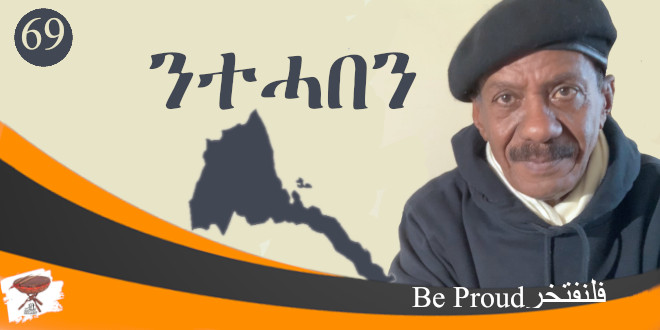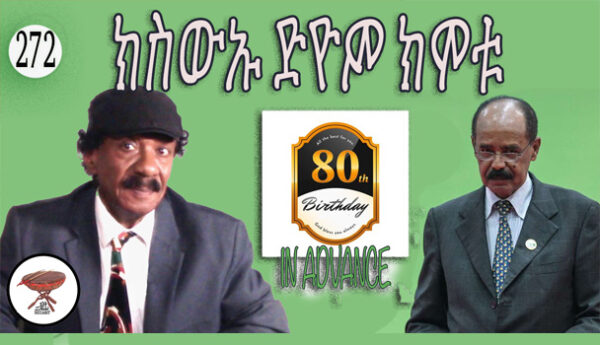Reintroducing Diversity In Eritrean Politics

On Saturday, August 29, 2015, I attended an event hosted by Bologna Forum in Oakland. I had prepared a speech in English but then I decided to deliver it in Tigrinya; it was not a word for word translation, hence, I am not sure if it was in an expanded or condensed form, but I am sure it captured the main ideas from the English speech which is posted below.
Unfortunately there are spiteful and vengeful spoilers who need help with their sanity, therefore, I will first offer them a brief explanation.
Reconciliation has been my motto for decades, therefore, I have never been a fan of exclusive functions that doesn’t reflect the Eritrean diversity. However, I am all for engagement, even with declared bigots and hypocrites let alone with genuine patriots like my hosts. And if I see something wrong in that aspect, I do not shy away from pointing it out. I detest those who lack courage and wisdom to call things as they are–some elements have rightly pointed the fact that I should have blasted the Oakland meeting the day I discovered I was the only Muslim among 21 Christians in the list of guests. Since I didn’t, according to their logic, then my criticism of such warped meetings in the past was hypocritical. I ask these amateurs, if they had ever voiced their objection to such meetings that they attended–they haven’t. Furthermore, I stand by my position on previous meetings organized by some bigots (not all the attendants). And if some individual’s blood is boiling in defense of their inherent hypocrisy, for their failing to point out to the imbalance and for being exposed, they are just proving their mettle. At any rate… here follows my original speech of yesterday:
Why am I here? I am here because I am everywhere I am invited to. I am here because that is the role I chose, that is how I have been struggling for years and years. Does it mean I endorse any meeting I attend, or any Eritrean configuration that I see? No. Do I feel comfortable to talk about diversity in a congregation that has no semblance of diversity? Not at all. If I did, I will betray the cause for which I struggle. When I see warts in an operation, I have to mention them. I do not enjoy being the only Muslim among the 21 assembled “speakers” or “panelists,” among whom are people I respect very much. However, this hall is filled with my friends, close allies, potential allies, and beautiful Eritreans that I love and respect. But I have to emphasize a few things: I object to tokenism even if I understand it is not for lack of good intentions. I also understand the imbalance is not created by the organizers of this meeting, but by the despicable Isaias regime that is polarizing, fragmenting, oppressing Eritreans, creating distances and sowing mistrust among its components. I recognize the genuine intention and will of the hosts of this meeting to expand its diversity, and I promise to help them, and any other group, to make their meetings more inclusive and representative of the true face of Eritrea.
Let me take you back in time, to the time of my early adulthood.
When I was growing up, there was an Ethiopian soldier who smuggled military belts, jackets, and other things from the camp and sold it to Mohammed, a well known, much loved, and fun guy who owned a shop in my neighborhood. Mokennen became friendly with those of us who hang around Mohammed’s shop. He would tell us about his escapades and his bravery in the last battle against the bandits in which he fought bravely. Then he will receive the money for the things that he sold to Mohammed and go to the nearest bar to drink. One day he was lecturing us about the greatness of Haile Sellassie in a very animated way. To explain that the struggle of the shifta (ELF) is in vain and they will never defeat Haile Sellassie, he went to the wall and pushed it with all his might, shaking and sweating. He then asked us, “Gdgddaw tenqesaqese?” We shook our heads, ‘No the wall didn’t move.’ He smiled, “Haile Sellassie endezih gdgdda now” Haile Sellassie is unmovable, like the wall.
That demonstration taught me a lesson that I will return to later on.
No one can doubt that Eritreans believe in diversity, at least most of us. And we know there are some who give the goal only lip-service without following up their declared belief with action–tangible action, not just empty speeches and statements. But why do we fail in displaying our national diversity? Why can’t we be closer to each other as compatriots when we are closer to other races and nationalities, some of whom we never knew existed until we were exiled? Are we working to remedy this embarrassing shortcoming, are we really working?
There is no doubt that some of us have abandoned our families for this struggle; some of us are impoverished by it, some of us have spent all their health on this struggle. The sacrifices in money, time, health and deferred personal achievements are huge. Yet, the result is abysmal. Imagine the man-hours (and women hours!) we spend on this struggle. If instead we all worked flipping hamburgers at a joint, for minimum wage, I think we would have accumulated billions of dollars. If we had gone to school for the hours and years we spent on this struggle, we would have been the most educated communities wherever we reside. If we just stayed home and did nothing, we would have rested and saved huge amounts of money. Imagine: coming here I spend about forty dollars, just on gas and car cost. In the last fifteen years I have come here and other places hundreds of times, and the expense is mind-boggling–many in this room have done the same, they have sacrificed their time and money, and their emotions, for the struggle. But what is the result? How can we justify it? Unfortunately, like many things in life, all the incurred cost cannot be justified by the achievements. It’s irreconcilable, as a basic accounting would show? Where did our sweat and efforts go?
Remember Mokonnen, the Tor Serawit who taught me a lesson? He had the answer.
Work is basically an “activity involving mental or physical effort done in order to achieve a purpose or result.” Spending money is also work because the money spent is generally earned by work. Therefore, according to the “hypothesis” of the unmovable wall, which is elevated and in known as “Mokonnen’s theory,” if I go to that wall and push it for eight hours, five days a week, for one year, I would have spent 2080 man-hours. Will anyone doubt that I worked hard to move that wall? I did, my time and efforts are worth, at least, the equivalent of $20,000 dollars–if I had worked at a McDonalds joint instead. See! No one will doubt my intention to move that wall. Then, if I came to this meeting and complained, “hey, I have been working on this wall for a year but it would not move!” What would you tell me? Would you tell me to keep pushing, and someday I will be able to break through it? Or, you would chuckle at my foolishness? Or, maybe you would tell me that I am not doing it right, and point out to me that I am not using the right tools. Maybe someone would bring a hammer and prove to me how efficiently he can do it in a few minutes!
Ladies and gentlemen, we are pursuing the diversity issue by following Mokonnen’s theory; we are trying to remove the wall by pushing it with our bare hands. And you know, if Eritreans followed that theory to push away both Haile Sellassie and the Derg, we wouldn’t have succeeded in removing them. We didn’t confront their armies head on, at least not until we accumulated and built matching power. Instead, we used guerrilla tactics, small, mobile, flexible, focused, and disciplined, and importantly, principled and loyal units to do the incremental pushing. Our combatant died so their comrades could live. We made sure that everybody shared the small food that we found. Now, our diversity can only be solved by reverting to the Ghedli values, the Sewra values of yesteryear that helped us achieve independence–of course we need the Ghedli values less its dictatorial tendencies, less a few of its selfish leaders and conniving chief.
We are failing to be diverse because we have not fully embraced the idea of diversity. We have not internalized it and it remains a vague concept in our minds, we never fully understood it and we didn’t elevate it to action. During the struggle era, we had poletikawi tmhrti, it was indoctrination for the service of the struggle. If you do not like the struggle and its indoctrination, you shouldn’t have joined it. Do we do politikawi tmhrti in our current struggle to educate people about diversity? Of course not. We are independent cells that never join to become a bigger body. And to challenge that, I see some people bringing along corporate training modules and projectors to educate people, to motivate them–something people like Dr. Bereket has been doing for ages. But the situation is different, no lecturer in this struggle can expel students who are not willing to abide by the rules of the school, or the class.
Does anyone command the authority of a professor to discipline the members of the opposition? Can anyone run the opposition based on military discipline? No. If you are a leader, and you attempt to educate the activists, they will tell you accessing knowledge is a youtube click away and there are ample educational clips. Even when someone gives a speech, we are used to saying “astemhro hibuna” or, “halewlew ybl neru.” Why is that so? Because we are running in circles and not discussing tangible matters. Diversity is tangible, and it can be sensitive, and the best we can do to overcome that problem is to discuss it openly and honestly. Only then we can learn the problems and solve them, instead of banging our heads against the wall because we are annoyed by the symptoms.
Everybody is missing from this seminar except people from the highlands, maybe voluntary representatives of some other groups. And some other groups have sent their ambassadors here, maybe a Saho speaker, Beni Amer? Nope. Blin, Mensa’E? Maybe an ambassador, or two….. Relax! It is okay to make fun of yourself–of your weakness. Nobody is perfect unless they deny they are imperfect. And Eritreans are perfect people; If anyone doubts that, he faces the risk of being accused of being a fake Eritrean!
Therefore, why is this room all “Tigrinya”? Why does it look like a village Uqub meeting? I know that you went shopping for individuals from other groups, and you failed. But if you had succeeded, what would you have discussed? Selamawi, Gonetswai qalsi? Constitution yetegber? Sedet yebq’E? demokrasiyawi mhdera?
I embrace all of that as a national concern, not as a regional or sectarian concern. And because I consider it a national agenda, the issues that concern others should be addressed equally. If you will be so engrossed only in limited issues, and forget about the land issues, about the cultural issues, about the refugees who have been stranded in Sudan for decades, then the Eritreans who are not here will tell you: go ahead solve your problems and I will solve mine.
I attend meetings of other Eritrean groups–very few in comparison to this, mainly private social gatherings, and what I hear is all about self-centered issues. No one mentions gonetsawi or selamawi qalsi. No one mentions the refugees except those in Sudan, no one mentions Demhit. No one mentions Badme. We live in a parallel universe. Unless we bring those parallel universes together, in defiance of the laws of geometry, where two parallel lines never meet, we are doomed. We will be pushing a wall and we will never be able to move it. Let’s use the hammer to squash the bricks.
I am convinced that Eritreans are inherently good, like all human beings and not because they are Eritreans, or special. Our internal relations, at the traditional level are as strong as one can imagine. Our regional and sectarian ties run deep in our history. Our traditional conflict resolution mechanisms are very effective. Fear mongering aside, we should not leave open cracks through which despicable groups like AlQaeda or ISIS could sneak and wreak havoc in our country.
It is important that we find refuge, and fall back to our traditions, culture, and the laws of coexistence that served our societies for centuries, in bad and good times. True, our traditional laws are all undemocratic in nature–they are particularly unfair to women. And since we have social and national political problems, we have to deal with them by enacting inclusive laws–a constitution being one. But don’t despair, we have the struggle era experience that we can emulate as far as co-existence is concerned. However, we have to recognize that our societies, particularly the Diaspora, is totally ignorant about the Eritrean culture of coexistence. And that has become a liability that needs to be addressed.
In the West, employers, house renters, and even car purchase financiers run the credit history of the applicant. Many have suffered of an unpaid or disputed bill because they didn’t know how to correct that and it chases them like a nightmare. At any rate, credit history applies to many things, not only renting a place or getting employed. People with a low credit score and history–on their knowledge of Eritrean norms–have become the dead weights of our struggle. At the end, if one is struggling for himself, himself meaning his current abode in the West, and choosing between the Swedish and American types of government, for example, he is a liability to the struggle–that objective is not the objective of the Eritrean people at this time.
To hasten our victory over the Isaias regime, we must struggle selflessly for the benefit of the millions in Eritrea. If we are struggling for selfish reasons, we would do a great service to the struggle if we just pull out of it, wrap ourselves in gabi and drink coffee all day, or go nightclub hopping… whatever works. This struggle is not being waged for the illusionary Eritrean zobas that we created in the Diaspora. The USA, England, Sweden, Qatar, and other places of our exile, or adopted homes, are not extensions of Eritrea. Eritrea doesn’t have zoba ade engliz, zoba america, zoba norway, or awraja Australia. These are sovereign foreign territories; we need to come to terms with that. The beneficiaries of this struggle are Eritreans in Eritrea, first. In short, the outcome of our struggle should benefit the Eritrean people first; the Diaspora can only benefit by extension, maybe even by association since most have adopted new homes and some of us do not have the intention of returning, regardless if Isaias rules or not.
Finally, I have a trademark remedy for overcoming the diversity issue. I prescribe it to the audience wherever I talk about this topic. I challenge everyone here to check the address book of your mobile phones and see how diverse your list is. Relatives and coworkers should not be counted. I consider my list a crown that I wear in this struggle, with pride. I have a diverse list and I know some of you here have similar lists. But I guess most lists will start with Tesfai and finish with Daniel, just like the other lists I know starts with Abdu and end with Idris. That is not the case with most veterans of the struggle, and certainly not in Eritrea. This is mainly a Diaspora disease. So, can you take it upon yourselves to expand your list, make it diverse, know what other Eritreans are thinking, make it a learning process? Once we do that, trust me, we will not need to talk about inclusiveness because it will be a reality.
Thank you




Awate Forum